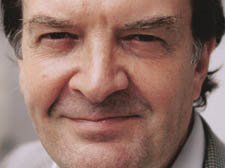|
|
 |
| |

Gerry Harrison |
For the cynical, there are no ambitions like political ones
The days of great local government have passed, and the Town Hall is now seen as a career stepping stone rather than a service to the community, writes Gerry Harrison
THE news that two Camden councillors are stepping down between elections surprises no one.
The Conservative sees a better future serving in a Tory administration at Westminster, and the Lib Dem would rather be in the USA.
Soon after the last local election a Labour member sought a career working with Ken Livingstone, with the entirely predictable election result that followed.
It has always been thus. People move on. The benches of a council chamber can often be stepping stones to a career. This has now accelerated.
The long-term conviction, shared by most politicians, to right injustice or improve the world, is now unusual.
A new breed has emerged: from student politics, researching for an MP, a brief career in PR or the media, and then instant readiness to take on the affairs of the state. As Alan Sillitoe wrote in his Guardian letter (September 11), “Where once we were ruled by aristocrats, or by workers’ representatives, we are now governed by a political elite whose members have made politics their full-time career of choice.”
Sillitoe described central government but, locally, such ambitions were comparatively rare.
Many councillors resembled good community workers. I support this view, and was therefore attacked as “a glorified social worker”. My party colleague who said this believed she was insulting me – I accepted it as a compliment.
Candidates once came from local campaigning, local businesses, local housing estates or the voluntary sector, but usually with party experience.
Sometimes they emerged through single issues: what happened to that Lib Dem’s promise to see through the renovation of Kentish Town baths, which had him so comfortably elected? No, the skies of Arizona are more tempting.
Things were exacerbated by Tony Blair’s notorious 2001 Local Government Act. Before this, front and back-bench councillors were closer representatives of their constituents, and made decisions on their behalf.
They also sat on specialist committees, and it did not matter which political party they belonged to because a good chairperson would encourage them to participate in debate and so influence the forthcoming vote. They were part of the decision-making process.
Council officers attended meetings, and members soon learned those who would assist them. Now, most new councillors never meet key officers.
On committees they also gained a particular expertise. Now, if an executive member falls under a bus, the lack of specialist experience creates a succession problem.
Local authorities now follow the Westminster model. Blair has called it “democratic renewal”. In Camden we called it “democratic denial”.
Officers love it: they have an easier life. Executive members love it: they have unchallenged power over their portfolios, and if they can end the business early enough to get to the pub, so be it.
Executive meetings in Camden now race through agendas. Few members of the public attend. The desire to change the world has been smashed by the system, leaving an abiding sense of frustration.
At one time many councillors were people of maturity who had made a decision to give something back. This required commitment, a thick skin and stamina. Now, the desire to elect truer representatives in terms of age, gender and race may be well-intentioned, but it means that potential candidates have other concerns, such as relationships, families and careers.
For the cynical, however, there are no ambitions like political ambitions.
A couple of years as a councillor can mean the acquisition of status or a handy paragraph in a CV. The wisdom of experience counts for nothing.
Perhaps election is no longer the way to make a difference.
A tenants’ leader from Kentish Town who joined the Labour Party in order to become a councillor, at a time when most members were leaving, has himself left the party. He feels he can achieve more outside the council, through letters to the New Journal and other means, other than within it. He is probably right.
The great days of local government have surely passed. We will never return to the municipal benevolence of Birmingham in the early 20th century or even to Camden in its second half.
A Town Hall is a whistle-stop on the tour to the top, with little long-term commitment and a fleeting scorn for constituents.
One wonders who will be following the two who are stepping down.
|
 |
|
| |
|
 |
|